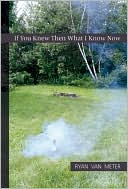
If You Knew Then What I Know Now
by Ryan Van Meter
Sarabande Books. 211 pages, $15.95
COMING OUT and coming-of-age are certainly well-worn themes in gay literature, so it’s refreshing to see a young writer like Ryan Van Meter taking them in different directions. Or maybe it’s more accurate to say that he’s taking them in deeper directions. If You Knew Then What I Know Now, a collection of fourteen interlocking and inventive personal essays, is the Missouri-born author’s first book, yet his writing shows a polish and finely tuned attention to the inner dynamics of family and gay experience that’s rare for a debut volume.
At first glance, Van Meter’s subject matter seems perhaps a bit too familiar: the ongoing tension of boyhood baseball practice sessions with his father, a sexual awakening during a camping trip with his church’s youth group, an uncomfortable night out with another effeminate guy from his high school. But Van Meter’s precise details—a tank full of goldfish is described as “glittering and tightly packed together like sewn sequins”—and his distinctive narrative angles almost always set his essays apart.
The title essay, for instance, takes a second-person approach, a sensible decision since the author is addressing his younger self throughout much of the book. Two other boys in his sixth grade class devise a plan for Ryan to catch them pretending to kiss as a way to trap him into admitting that he’s gay. Another piece, “Things I Will Want to Tell You on Our First Date but Won’t,” cleverly employs a list format to build up a catalog of emotions and situations to which most gay men can easily relate: “That I will want to hear your boyfriend history but will not ask, and this I promise. That sudden silence doesn’t always mean awkwardness, sometimes it means ease. That we should split the bill. That you will have to lean in first to kiss me. That if you lean in first to kiss me, I will kiss you back.”
Among the strongest essays in the book are those that explore Van Meter’s own family history. “Lake Effect” stands out especially for its forthright inquiry into the constructs of masculinity. The author remembers an annual fishing trip with his father and two other father/son duos during the summer when he was eleven. Stuck together in a houseboat on a lake in Minnesota, the actions of every character in the essay are intensely magnified. When Ryan plays a song for one of the other boys, Jimmy, “he is dazed by the rhythm while I scrutinize his face, music rippling across it.” Later, when Ryan’s dad catches him staring at the shirtless, hairy chest of one of the other fathers, unconsciously sizing him up, his dad actually tells him to stop it, uncomfortably drawing the attention of everyone else on the trip.
These are moments when Van Meter startles and unsettles the reader, putting us in the position of a child who’s often forced to conform to traditional roles of gender and sexuality, and they’re the best scenes in the collection. “First,” the opening essay in the book, finds the author at age five, being scolded for proposing marriage to the boy who lives next door. In “Discovery,” Ryan sets the table for dinner at his grandmother’s house while wearing a blue satin dress that he found in a bedroom closet, just before his grandfather and younger brother return from a day of farming. At one point in the book, Van Meter writes, “There are some names for things that don’t fit if I think about them too much. Toenail. Cupboard. Hot dog. How much does a thing have to resemble its word? Butterfly. Boy.”
What I admire the most in Van Meter’s essays about growing up is how faithfully they cleave to the true insularity of children’s lives and that entire strange universe of childhood, with its secret and mysterious machinery. The later essays, which explore the author’s coming out and his relationships during early adulthood, are often equally profound and eloquent. In addition to an essay that offers one of the most powerful meditations I’ve ever read on the etymology of the word “faggot,” another essay titled “The Goldfish History” movingly recaptures the eight years that Van Meter spent with his first boyfriend, chronicled alongside the ever-present image of their goldfish Rufus (who was named, of course, after the gay singer Rufus Wainwright). If You Knew Then What I Know Now is both an auspicious debut and a work of mature and lasting insight.
________________________________________________________
Jason Roush, author of After Hours (Body Electric), Breezeway
, and Crosstown
, teaches at Emerson College and New England Institute of Art.






